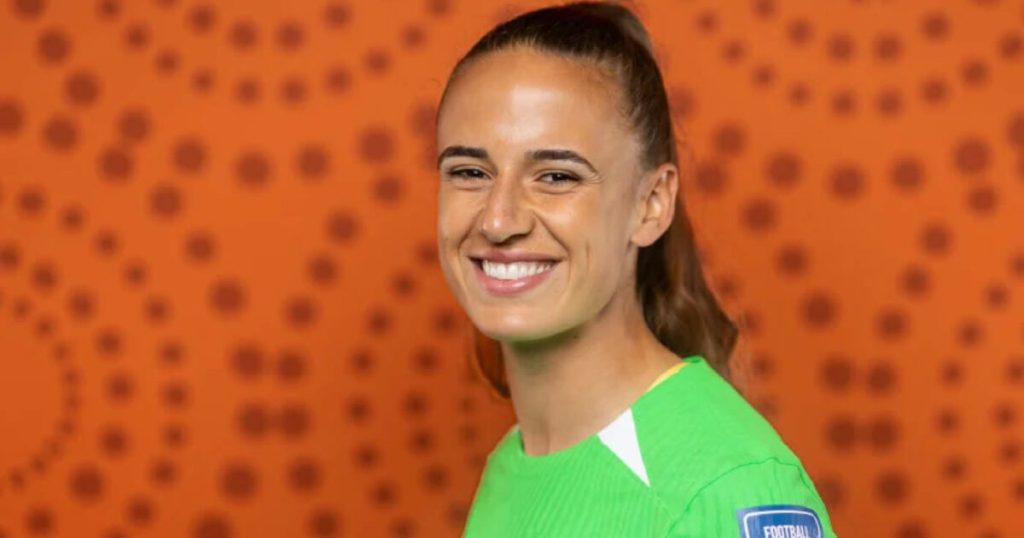Ashleigh Plumptre, a prominent defender for the Nigerian women’s national football team, known as the Super Falcons, has voiced significant concerns regarding the substandard facilities and inadequate support provided to the team during their participation in the 2024 Women’s Africa Cup of Nations (WAFCON) tournament hosted by Morocco. Plumptre’s criticisms highlight a stark contrast between the resources allocated to successful European teams, such as the recently crowned European champions, England, and the conditions experienced by the Super Falcons, ultimately raising questions about the commitment to equity and investment in women’s football, particularly within the African context.
During a candid interview with Lagos Talks 91.3 FM, Plumptre detailed the absence of fundamental recovery facilities, including a gym and pool, at the team’s designated accommodation in Casablanca, the city where they played all their group stage matches, as well as the crucial quarter-final and semi-final encounters. This lack of access to essential training and recovery resources, she argued, contributed to the players’ physical fatigue as the tournament progressed, potentially impacting their performance and increasing the risk of injury. She drew a comparison with the meticulous planning, substantial investment, and comprehensive support structures enjoyed by European teams, emphasizing the disparity in resources and the impact on player well-being and performance. The availability of suitable training grounds, recovery facilities, and other support mechanisms, she noted, are crucial elements that contribute to a team’s overall success.
Plumptre recounted the team’s struggle with inadequate facilities, revealing that they were eventually taken to a public gym towards the end of the tournament, a makeshift solution that highlighted the lack of foresight and planning by the organizing authorities. The uncertainty surrounding the responsibility for the subpar hotel arrangements further underscores the apparent lack of clear communication and accountability. Plumptre stated that the players were unsure whether the Confederation of African Football (CAF), the Moroccan Football Association, or the Nigerian Football Federation (NFF) was ultimately responsible for the lodging arrangements, exposing a potential gap in organizational oversight.
The defender further explained that the team’s initial accommodation prior to the commencement of the main tournament had included a small gym. However, upon transferring to Casablanca for the group stage and subsequent knockout rounds, they were downgraded to a smaller hotel devoid of essential amenities. This relocation, according to Plumptre, exacerbated the challenges faced by players, particularly those managing injuries or requiring consistent strength training to maintain their physical condition. Plumptre herself highlighted the ongoing management of an Achilles injury, emphasizing the importance of access to appropriate facilities for rehabilitation and injury prevention.
The Super Falcons’ captain, Rasheedat Ajibade, emerged as a strong advocate for her teammates, immediately protesting the inadequate accommodation upon arrival. Plumptre recounted Ajibade’s decisive action, urging her teammates not to unpack their belongings and demanding a change of lodging due to the lack of a gym, a crucial facility for athletes competing at a high level. While the team’s efforts to relocate were unsuccessful, Ajibade’s advocacy resulted in each player being allocated a separate room, alleviating the cramped conditions initially imposed upon them. The initial arrangement of two players sharing small rooms, where opening suitcases would restrict movement, was clearly unsuitable for a professional team participating in a major international tournament.
Despite the challenges posed by the inadequate facilities and logistical shortcomings, the Super Falcons displayed remarkable resilience and determination, culminating in a triumphant victory against the host nation, Morocco, in the final. Their 3-2 win secured their title as WAFCON champions, a testament to their skill, teamwork, and unwavering spirit. However, Plumptre’s revelations raise critical questions about the level of support provided to African women’s football teams and underscore the need for greater investment and improved infrastructure to ensure that players can compete on a level playing field, with access to resources commensurate with their dedication and talent. The Super Falcons’ success in the face of adversity should serve as a catalyst for positive change, prompting a thorough review of the logistical and infrastructural support provided to women’s national teams, not only in Africa but globally. This incident highlights the ongoing struggle for gender equity in sports and the need for continued advocacy to ensure that female athletes receive the recognition, resources, and support they deserve.


